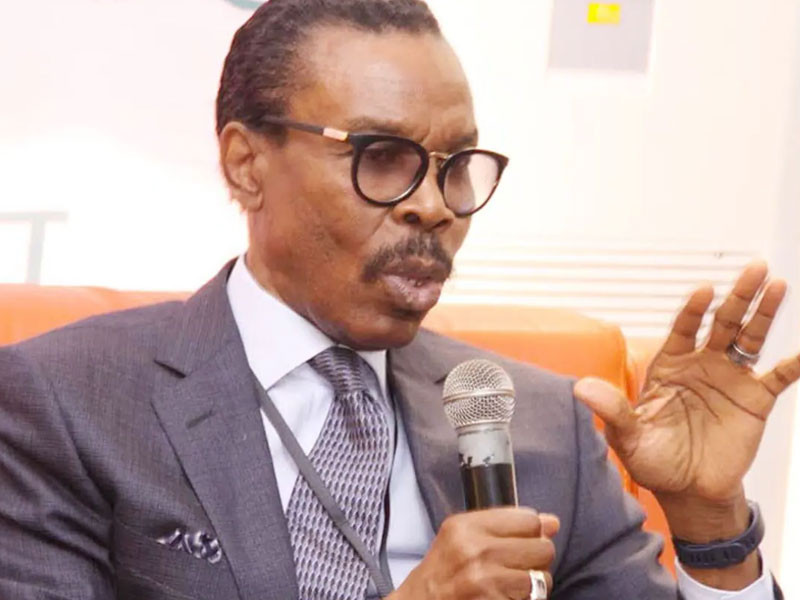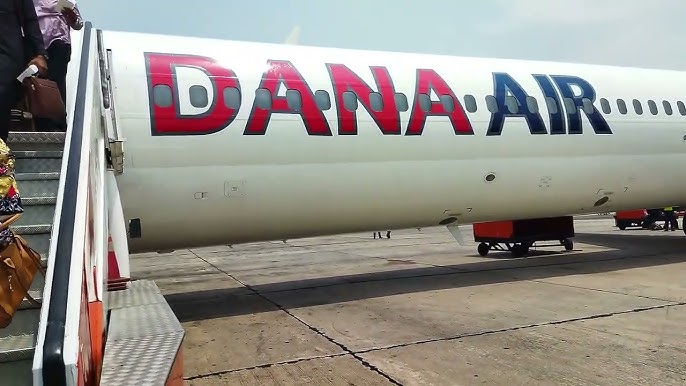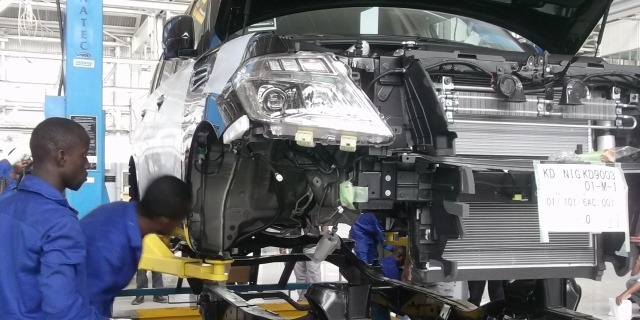Business
Rewane foresees structural reforms, drop in unemployment this year

Chief Executive Officer, Financial Derivatives Company (FDC), Mr Bismarck Rewane, says Nigeria is likely to implement structural reforms this year as it gears up to raise $3bn through loans in order to meet its infrastructure deficit.
He however said the informal sector would spur projected recovery, predicting that unemployment in the formal economy would decline slowly.
He stated this in his latest Lagos Business School’s executive breakfast meeting presentation.
The April 2021 edition of the monthly report, entitled “Oil Illusion and Financial Delusion,” was a review of the economic performance of the country in the just ended first quarter of 2021 and a peep into the second quarter performance.
Rewane said the depth of recession experienced in 2020 would leave a large fiscal and debt hangover for most African countries and would reduce the scope for policymakers to respond with stimulatory measures, citing Zambia as the first country in the region to default in its Eurobond repayment.
The report stated that several African countries, including Nigeria, Kenya and South Africa were planning to borrow from the international capital markets. Ghana recently successfully issued $3 billion Eurobond.
“Nigeria will raise $3 billion in 2021. Increased borrowing to meet infrastructure need will force Nigerian policymakers to implement structural reforms,” Rewane wrote in the report.
For Sub-Saharan Africa (SSA), the FDC CEO said pro-business policies and structural reforms would help bolster economic activity over the longer term, stressing that policy initiatives to address lagging productivity, skills and infrastructure would progress slowly.
He predicted an inverted V-shaped recovery for the SSA, noting that recoveries were diverging across and within countries.
He projected that the SSA economy would expand by 3.4 per cent in 2021 and four per cent in 2022, while Inverted V-shaped recovery was expected to occur in Nigeria and South Africa.
He added that while jobs in the informal sector would rebound faster as restrictions eased, inflation was projected to average 8.1 per cent in 2021, before edging down to eight per cent in 2022.
“From our perspective, we can say that Nigeria will experience an inverted V-shaped recovery while battling persistent inflation.
“Institutional and domestic investors are jittery as they attempt to make sense of ambiguous pronouncements and conflicting data,” he stated in the report.
Noting that the International Monetary Fund (IMF) and World Bank, at their spring meetings in Washington, expressed optimism about Nigeria’s economic recovery, he argued that the upward review of their projections on the West African country, rests heavily on optimal vaccine rollouts and stronger oil prices.
The IMF last week revised its 2021 Gross Domestic Product (GDP) growth projection for Nigeria to 2.5 per cent from one per cent, this, Rewane said was “a confidence boost for the much needed investment inflows.”
He warned, however, that the snares of insecurity, hyperinflation and policy uncertainty in the country could force investors to take their funds elsewhere.
Rewane also commented on the exchange rate policy, noting that the nuanced interpretation of flexible or floating exchange rates by policymakers made investors wary and was seen as a missed opportunity to embark on a unified exchange rate system.
He added that exchange rate convergence remained the sole objective of the Central Bank of Nigeria.
He, however, said the forex rationing had continued and that the I&E window was still controlled, pointing out that limited forex supply had forced manufacturers to source over 90 per cent of forex from the parallel market.
The FDC boss stated that forex intervention in the I&E window fell throughout March to an average of $66.63 million, indicating a preference for reserves accretion at the expense of exchange rate alignment.
“In all of this, the Nigerian consumer remains financially embattled. Disposable income is flat but discretionary income is sharply lower due to rising food prices, transport costs and electricity bills. Many state governments owe salary arrears and labour is on a warpath,” he stated.
Aviation
FG suspends Dana Air for comprehensive audit

FG suspends Dana Air for comprehensive audit
The Federal Ministry of Aviation and Aerospace Development has ordered the suspension of Dana Air flight operations.
This came about 24 hours after the airline’s runway excursion incident at the Murtala Muhammed International Airport in Lagos.
The directive was passed on Wednesday to the Nigerian Civil Aviation Authority to be effected.
A letter signed by the ministry’s Permanent Secretary, Dr Emmanuel Meribole, addressed to the NCAA said recent incidents involving Dana Air had raised concerns about the safety and financial viability of the airline’s operations.
It said the suspension would not be lifted until comprehensive audits on the Dana Air’s fleet had been conducted.
It stated that the audit would include safety protocols, maintenance procedures and financial health.
It stressed that the move to suspend the airline was aimed at ensuring the safety and well-being of Nigerians.
The statement reads, “As the supervisor overseeing our nation’s aviation safety and regulatory compliance, it has come to the Honourable Minister’s attention that recent incidents involving Dana Airline have raised serious concerns regarding both the safety and financial viability of their operations.
“In light of these incidents and with the paramount priority being the safety and well-being of our citizens and travelers, the Honourable Minister has directed that you immediately initiate the suspension of Dana Airline’s fleet until a comprehensive audit can be conducted. This audit should encompass all aspects of safety protocols, maintenance procedures, and financial health to ensure full compliance with our aviation regulations.
“The recent incidents have underscored the urgency of this matter, and it is imperative that swift and decisive action be taken to safeguard the interests of all stakeholders involved.”
Auto
African automakers, minister, NADDC DG for June 27 Nigeria industry summit

African automakers, minister, NADDC DG for June 27 Nigeria industry summit
A delegation of the African Association of Automotive Manufacturers (AAAM) from South Africa is expected in Nigeria on June 27 this year to attend the maiden edition of the Nigeria Auto Industry Summit (NAISU).
The team will be joined by the Nigeria Association of Automotive Manufacturers (NAMA) team and other leading stakeholders to brainstorm on the sector’s development in the country and by extension Africa.
The organisers of the event, Nigeria Auto Journalists Association (NAJA), disclosed this in a statement, adding that it would be organised in partnership with the National Automotive Design and Development Council (NADDC).
Scheduled to hold at Radisson Hotel, Ikeja, Lagos, on Thursday, June 27th, 2024, the summit is envisioned as an annual flagship event of the country’s automotive industry to rally all stakeholders together to explore the great potential in the automotive sector for national development.
It said the maiden edition of the event would be declared open by the Minister of Industries, Trade and investment, Dr Doris Uzoka-Anite, under the theme ‘Reviving Nigeria’s Economy through the Automotive Sector’ .
It would have the NADDC Director General, Mr. Joseph Osannipin, as the chief host, it stated.
Commenting on the importance of the summit for the development of the country’s automotive sector, Chairman, organizing committee of NAISU, Femi Owoeye, said, “Initiating this summit is vital, especially at this moment in history, when Nigeria is struggling to map its way out of the prevailing global economic despair.
“Being one of the drivers of the global economy, the automobile industry, if given the necessary impetus in Nigeria, is capable of transforming the country to an automotive manufacturing hub in Africa.
“To this end, Nigeria Auto Industry Summit shall annually produce significant information that would help the government to make it happen.”
On his part, Chairman of NAJA, Mike Ochonma, said, “Significantly, the summit shall bridge the information and communication gap between the nation’s auto industry stakeholders and relevant government agencies.
“Moreover, annually, the summit shall give a single and united voice for the auto industry leaders to set developmental agenda aimed at kick-starting and driving relevant government policies towards a sustainable development of the automotive industry in Nigeria and ultimately position the country as a frontline beneficiary of the African Free Trade Agreement Area.”
Business
CBN releases more dollars as naira weakens to 1,300/$

CBN releases more dollars as naira weakens to 1,300/$
The naira depreciated further against the United States dollar at the official market on Tuesday, closing at 1,300/$.
This came as the Central Bank of Nigeria stepped up efforts to stem the tide, selling more dollars to Bureau De Change operators.
The apex bank disclosed the dollar sale in a new circular referenced TEM/FEM/PUB/001/013 and uploaded to its website on Tuesday.
It was signed by the CBN Director, Trade and Exchange Department Dr Hassan Mahmud.
The apex bank said it was set to sell $10,000 to BDCs at N1,021 per dollar and directed the operators to sell at a spread not more than 1.5 per cent above the CBN rate.
Amid the development, the naira maintained a depreciation trend against the United States dollar on Tuesday, falling to N1,300 per dollar at the Nigerian Autonomous Foreign Exchange Market.
The new rate is N66 per cent weaker than N1,234 per dollar recorded on Monday.
A summary of the forex transaction showed that the intra-day high depreciated by N22, closing at N1,317 per dollar from N1,295 per dollar. The intra-day low however gained to N1,000 from N1,051/$.
READ ALSO:
- Large-scale earthquake hits Taiwan
- ‘Tiwa Savage paid IT expert to wipe sextape off internet’
- Senate backs education minister over 18-year entry age into varsities
While the total daily turnover increased slightly to $133.65m from $110.17m on Monday.
At the parallel market, currency traders sold the dollar between the rate of N1,300 and N1,320 on Tuesday from N1,260 recorded on Monday.
Earlier this month, the apex bank sold $10,000 to BDCs at a rate of N1101/$ and directed the BDCs to sell to eligible customers at a rate not exceeding 1.5 per cent above the purchase price.
This initiative represents the second such occurrence this month and the fourth instance this year, underlining the CBN’s proactive strategy in managing currency volatility and ensuring the availability of essential foreign exchange.
The PUNCH reported on Monday that the Naira depreciated against the United States dollar reaching an exchange rate of N1,234 at the official foreign exchange market. This represents a decline of N65 or approximately 5.26 per cent from the previous rate of N1,169.99/$1 recorded on Friday. The fluctuation in exchange rates can have significant implications for trade and economic stability.
The statement read, “We write to inform you of the sale of $10,000 by the CBN to BDCs at the rate of 1,021/$. The BDCs are in turn to sell to eligible end users at a spread not more than 1.5 per cent of the purchase price.”
This recent move follows the CBN’s resolve to continue to defend the naira as stated by the bank earlier.
The CBN directed all eligible BDCs to commence payment of naira deposit into the designated CBN accounts from April 22, 2024.
It also asked the operators to submit proof of payment and other documents at the appropriate CBN branches for disbursement.
CBN releases more dollars as naira weakens to 1,300/$
-

 Education4 days ago
Education4 days agoWhy we charge N42m fees for primary school pupils — Charterhouse Lagos
-

 News6 days ago
News6 days agoUpdated: More trouble for Yahaya Bello as Immigration places him on watch list
-

 Auto4 days ago
Auto4 days agoWe expect massive roll-outs of Nigeria-made cars by December 2024 – Minister
-

 International6 days ago
International6 days agoUpdated: Tragedy hits Kenya, Defence chief, nine others die in military helicopter crash
-

 metro4 days ago
metro4 days agoJUST IN : Borrow pit collapses, kills seven Qur’anic school pupils
-

 News4 days ago
News4 days agoWe’re not part of Yoruba Nation agitation, says MKO Abiola family
-

 metro2 days ago
metro2 days agoHow gunmen killed Babcock university lecturer, abducted two – Police
-

 News7 days ago
News7 days agoYahaya Bello: EFCC warns against obstruction of operations






















